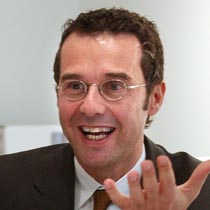Environment a serious issue for business leaders
Ashley Ford
Province

Bob Rennie, no greenhorn when it comes to selling real estate
Bob Rennie, no greenhorn when it comes to selling real estate, says going “green is going to sell condos, newspapers, magazines and get politicians elected.”
Said the head of Rennie Marketing Systems to the Urban Development Institute’s annual meeting yesterday: “My theory is for now we are all going to be opportunistic with green. It is our new lemon fresh.
“Today we are green because it is a marketing opportunity.”
The institute represents the development industry, and Rennie’s annual snapshot and projections about the market are closely monitored.
He said many influential political and business leaders are starting to take the environment seriously and signalling that it won’t just be business as usual in the future, because the planet and consumers will demand it.
“Instead of talking about going green or whether goals can be achieved, let’s just start by doing our part to achieve them,” he said of developers.
Rennie also had some harsh words about the situation in the Downtown Eastside, which he called “a disaster area all of us should be ashamed of.
“It’s a night of living hell taking an evening walk down there,” he said.
It may not be for much longer, however, as the city is fast running out of land to develop, the inner east side is already in developers’ sights, and prices are rising quickly.
Rennie said the current model of centralizing poverty doesn’t work and new ways are needed to integrate the “haves” and the “have-nots.” Although the province purchased 10 rooming houses/hotels last month for single-room accommodation, Rennie doubts Victoria is in it for the long term.
“My bet is that the province will maintain this housing in place until 2010 and post-Winter Olympics and then start to decentralize this housing to other areas and sell off or rebuild the sites,” he said.
He said the Woodward’s development — which consists of 200 non-market housing units and 536 market condos — may prove to be an example of a better way.
Asked about the market overall, Rennie suggested it’s more of the same — all systems go with ever-rising prices.
Prices are sustainable because there is virtually no inventory, he said.
Investors are buying because of equity growth and that is saving the rental market. But at the end of the day, said Rennie, Vancouver has been discovered.
“We are not a financial centre, we are not a head-office city, we are a real-estate city, a resort city and we are an amazing place to live,” he said.
Rennie’s comments came on the same day that a TD Economics report predicted that Canada’s major condo markets should remain strong this year and next.
The report, Condos To Remain An Attractive Option for Many Home Buyers, said a robust labour market, supportive interest rates and an aging population would support “robust demand” for condos.
It predicts the annual rise in Vancouver condo prices will slip to 10.5 per cent in 2007/08 from 16.3 per cent in 2005/06. Price gains in Calgary will fall to 10.5 per cent from 26.6 per cent while Edmonton price growth will drop to 12.5 per cent from 16.6 per cent.
© The Vancouver Province 2007
